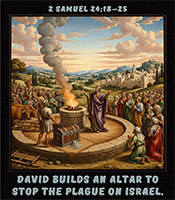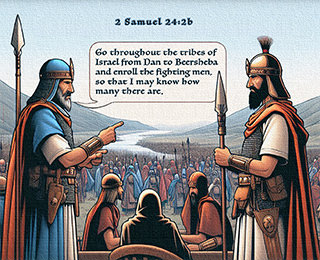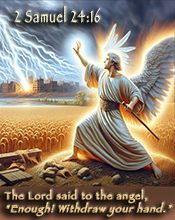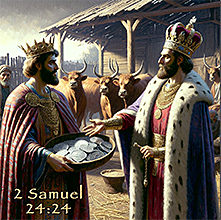2 Samuel 24:1–25 . . . Bible Study Summary with Videos and Questions
“David Enrolls the Fighting Men and Builds an Altar”
The last chapter of this second portion of the book of Samuel provides a fitting conclusion to David’s story by calling attention, once more and finally, not only to his ambition and pride, but also to his humility and remorse. Every spiritual leader, as well as all hearty souls, would do well to read this story once a year!
Chapter 24 deals with David’s third recorded sin: His sin of “numbering Israel.” A plague came upon the people of Israel when David, in his pride, began to rely on his own resources and apparent military might, instead of relying upon the grace and power of God. Accordingly, what should this closing chapter teach us? Well, we ought to appreciate this great truth: Our old natures are always there, ready to spring into activity the minute we cease relying upon the Spirit of God to guide and guard us. Sin never dies of old age. No matter how long you walk with God, it’s still possible to fall. The only thing that maintains a righteous spiritual life is the quiet, day-by-day, moment-by-moment, close, faith-filled walk with the Lord.
[Note: Click the link to This Week’s Passage near the bottom of this page to read today’s Scripture.]
David Sins by Numbering Israel’s Fighting Men (2 Samuel 24:1–9)
For some reason that the author doesn’t indicate to us, God was very angry with Israel. Our text literally says that God was “hot” over Israel’s sin. We see this expression of divine anger very often in the Old Testament. In each case, it was a serious sin that inflamed the righteous anger of God. Again, here in chapter 24, God was angry with Israel; he was determined to divinely discipline such stiff-necked people by bringing David’s sin, which somehow brought both guilt and punishment on the people. In focusing our attention on David’s sin, let’s not forget that this incident takes place because of Israel’s sin.
It was probably around 975 BC when David decided to number the fighting men of Israel in the north, and Judah in the south. After the back-to-back rebellious revolutions of Absalom and Sheba, it would have been reasonable for David to reassess his military situation against the possibility of similar uprisings or other emergencies. In support of this supposition is the fact that Joab and the army commanders had taken more then nine months to gather the population statistics (v. 8). This suggests a peaceful condition in Israel that characterized David’s later reign, not his earlier reign.
David Enrolls the Fighting Men
24 1Again the anger of the Lord burned against Israel, and he incited David against them, saying, “Go and take a census of Israel and Judah” (2 Sam. 24:1).
We can identify perhaps four levels of causality in v. 1: (1) God was the final cause, (2) the primary instrumental cause was Satan, (3) the secondary instrumental cause was some hostile human enemy, and (4) David was the efficient cause. The Lord was angry with Israel for some reason. He evidently allowed Satan to stir up hostile enemy forces to threaten David and Israel (cf. Job 1–2). In response to this military threat, David chose to number his people in the north and south. The Lord didn’t force David to sin; he sinned because he failed to consult with Yahweh.
Clearly, David took that census to determine his military strength. Merely taking a census didn’t constitute sin: Moses numbered the fighting men of Israel in preparation for battle (Numbers 1:1–4); he also numbered the Kohathites (Num. 4:2) and the Gershonites (Num. 4:22) for priestly service; Saul numbered the Israelites to defend the people of Jabesh-Gilead by fighting the Ammonites (1 Sam. 11:8); and David numbered those loyal to him in preparation for defending himself against an attack by his son, Absalom (2 Sam. 18:1). In none of these cases was numbering wrong. He apparently sinned by placing his confidence in the number of his soldiers rather than in the LORD. For the chronicler in particular [cf. 1 Chronicles 27:23–24], the element of David’s transgression appears to be that his taking a census would have impugned the faithfulness of God in the keeping of His promises, as if one would walk by sight instead of by faith.
Interestingly, we find a word of warning related to people-numbering in the Book of Exodus, as highlighted by Josephus as another reason why this census displeased the Lord: Now King David was desirous to know how many ten thousands there were of the people, but forgot the commands of Moses, who told them beforehand, that if the multitude were numbered, they should pay half a shekel to God for every head [Exod. 30:12–16].
It’s clear from this closing chapter’s text that there’s something less than pious about numbering the military. It was an evil act for which atonement must be made; otherwise a plague would come upon the nation. The word “enroll” or “register” (vv. 2, 4) literally means to “muster” in preparation for battle. Joab and fellow commanders crossed the Jordan, proceeding north, then west, and then southward, traveling about the nation in a counter-clockwise direction. Included in the described territory was the territory that God had promised to give Abraham. Apparently, there were 800,000 valiant warriors in Israel, plus 300,000 recruits (cf. 1 Chron. 21:5). In Judah there were a total of 500,000 seasoned fighters
[The figure of 470,000 in 1 Chronicles 21 probably omitted the Benjamites (cf. 21:6).] The Hebrew word eleph (vv. 3, 9) is traditionally translated as “thousand” but can also mean “clan,” “family group,” or “military unit,” which is the likely the applicable meaning.
Joab (v. 3) and the commanders of the army (v. 4) were opposed to numbering the fighting men of the nation. Even a man like Joab could have seen that what David planned to do was wrong. Nevertheless, David overruled him and the other commanders, insisting that a census be taken. Reluctantly and half-heartedly, Joab went about this abhorrent task, which was a major undertaking. David behaved as one who refused to be accountable to anyone, which was easy for him to do since he was king. What he’d done displeased the LORD so that He struck Israel (21:7).
David Confesses His Guilt and Takes Full Responsibility (vv. 10–14)
Without having to be rebuked, David recognized his sin in numbering the fighting men of the nation and repented. He confessed how great his sin had been and acknowledged the foolishness of his actions (v. 10). This sense of guilt and his confession apparently took place during the night because when he awoke, Prophet Gad came to him with a word from the LORD. There was no debate or discussion about whether or not David had sinned; it was a given that he had. The only matter to be decided was what punishment he’d choose.
Apparently, the census was completed before David acknowledged that he’d sinned. Finally, because the guilt for his pride penetrated his conscience, he confessed his sin and asked God for forgiveness (v. 10). Such a God-honoring response presented David at his best, being “the man after God’s own heart.” God graciously gave the king the opportunity to choose how Yahweh would punish the nation (v. 13). This may be the only instance in Scripture where God gave someone the ability to choose between a number of punishment options. Yahweh gave David three options, all mentioned in Deuteronomy 28, as punishment for Israel’s failure to keep their covenant with God. David’s choices included differences in the length of the penalty: three years of famine, three months of fleeing before their enemies, or three days of pestilence at the hand of God.
Because David was the head of the nation, his actions affected all Israel, as well as himself. He was to choose whether he wanted a long, mild punishment or a short, intense one. David chose the third option, not because it was the shortest time of suffering, but because it was God who’d administer this punishment more directly. David would rather suffer at the hand of God than at the hand of men. Ultimately, he chose to leave the punishment in God’s hands because he’d learned that God was kind and merciful (v. 14).
Quite possibly, this was David’s reasoning: If I choose famine, the people will say that I chose something what will affect them but not me, for I’ll be well supplied with food; … if I choose war, they’ll say that the king is well protected; … so let me choose pestilence, before which everyone will be equally vulnerable.
God’s Punishment of David (vv. 15–17)
15So the Lord sent a plague on Israel from that morning until the end of the time designated, and seventy thousand of the people from Dan to Beersheba died. 16When the angel stretched out his hand to destroy Jerusalem, the Lord relented concerning the disaster and said to the angel who was afflicting the people, “Enough! Withdraw your hand.” The angel of the Lord was then at the threshing floor of Araunah the Jebusite.
17When David saw the angel who was striking down the people, he said to the Lord, “I have sinned; I, the shepherd, have done wrong. These are but sheep. What have they done? Let your hand fall on me and my family” (2 Sam. 24:15–17).
The LORD was angry with Israel. The pestilence that came to his people was justly deserved, not only because of David’s sin but because of Israel’s. Ironically, he sought to learn how many Israelite warriors were at his disposal; as a result of his finding out, the numbers were diminished by 70,000 men. Wanting more land and more people to rule, he suddenly found himself with 70,000 fewer subjects. Those who died may have been 70 military units of soldiers. David’s latest sinful act was a selfish act, which is the same for us. It’s all about initially bringing ourselves pleasure before beginning to care about the toll that our aims will take on others.
The plague came upon every part of the nation. The destroying angel of the LORD seems to have almost retraced the steps of those who numbered the nation. That angelic messenger from God then approached Jerusalem, ready to bring calamity there as well. “Seventy thousand men” (v. 15) was more than three times the number of men who followed Absalom and died in his uprising (i.e., 20,000; cf. 2 Sam. 18:7). Evidently, God gave David the ability to see the angel who had his sword lifted high, who was killing the people who’d entered Jerusalem (v. 17). We’ve already been informed, however, that God had relented of bringing further calamity.
David’s faith in God for judgment was well-founded. God had poured out his wrath on his people, but now he took compassion on them. The LORD’s angel was standing by the threshing floor of Araunah the Jebusite when he was ordered by Yahweh, “Enough! Withdraw your hand” (v. 16). David couldn’t have known God’s purposes yet, so he petitioned God in an attempt to halt the plague. He asked God to have mercy on the people since he was the sinner responsible for the punishment. He pled that God’s anger would be satisfied by pouring out his wrath on him and on his father’s house.
Having ordered the census, he’d failed to appreciate the extent of the effects of his act. But God had a better plan, which he’d communicate to David through the prophet Gad in the concluding verses of this great book. Before looking at those verses, don’t miss noting David’s shepherd heart when he referenced his people as “sheep” (v. 17); he was willing to suffer and possibly die for the sake of his sheep.
David’s Acts of Repentance (vv. 18–25)
Gad came to David with a suggested solution: sacrifice. David was to erect an altar to the LORD, right there on Araunah’s threshing floor. Immediately, it seems, David began to make his way up to the place where the angel of the LORD had been halted. Araunah and his four sons were there at the threshing floor, threshing wheat; he looked up to see the angel of the LORD and also David and his servants making their way to where he was. It must have been a terrifying moment for him.
David proceeded to offer sacrifices in response to Prophet Gad’s instructions (v. 18). David needed to recommit himself to Yahweh (by offering burnt offerings) and to renew his fellowship with God (by offering fellowship offerings). God instructed him to present these sacrifices at the place where He’d shown mercy (v. 16); David willingly obeyed (v. 19). According to Jewish tradition, Abraham came and offered his son Isaac to be a burnt-offering at that same place.
Because Araunah was a native Jebusite, his land had probably never been sanctified (set apart) to Yahweh as other Israelite land had been (cf. v. 23). David purchased Araunah’s threshing floor for one and one-quarter pounds of silver. He insisted on purchasing it outright because a sacrifice that costs nothing can’t be deemed a righteous sacrifice. Both situations involving Abraham and David were desperate for everyone involved. At the same location where Abraham once held a knife over his son (Genesis 22:1–19), David saw the angel of the LORD holding a sword, ready to plunge it into Jerusalem. In both cases, death was averted by sacrifice.
It’s significant to realize that, according to both biblical and historical tradition, Araunah’s threshing floor on Mount Moriah was to become the site of Solomon’s temple. It was established as the place where Israel was perpetually reminded that, without the shedding of blood, there would be no remission of sin. Death for Abraham’s son Isaac and David’s Jerusalem was averted because the sword of divine justice would ultimately find its mark on the Son of God.
Closing Thoughts and Consideration
This chapter is a part of the author’s conclusion to all of “1 and 2 Samuel.” The author probably recorded this closing incident, not only because it accounts for the origin of the site of Solomon’s temple, but because it illustrates a basic theological truth taught throughout the book: Whenever someone whom God has chosen for special blessing sins, he or she becomes the target of God’s discipline; he or she also becomes a channel of judgment to others; only repentance will turn the situation around. When David agreed to obey God’s will that was revealed through Prophet Gad, at once he began to become a source of blessing again.
Much blessing came to Israel through the land that David bought from Araunah. Many early Jewish readers of “1 and 2 Samuel” would have viewed the purchase of the site of Solomon’s temple as the climax of the book. However, the building of this temple becomes the focus of the first part of “1 Kings.” Solomon’s temple became the centerpiece of Israel for hundreds of years; it was the place where God met with his people while they worshiped him corporately as the center of their spiritual and national life. Therefore, the mention of the purchase of Araunah’s threshing floor was the first step in the building of the temple, the source of incalculable blessing to come.
— The End —
† Summary of 2 Samuel 24:1–25
This final chapter recounts how David, under divine provocation, orders a census of Israel and Judah, an act viewed as sinful because it reflected misplaced reliance on numbers and human strength rather than trust in God. Despite Joab’s protests, David persists, and after a nine-month count, he is stricken by conscience and confesses his sin. God, through the prophet Gad, offers David a choice among three punishments: famine, defeat by enemies, or pestilence. David selects three days of plague, resulting in the death of 70,000 Israelites. As the angel of destruction approaches Jerusalem, the Lord relents, stopping the catastrophe at the threshing floor of Araunah the Jebusite.
Gad the prophet then instructs David to build an altar on Araunah’s threshing floor. Araunah offers the site and offerings for free, but David insists on paying, declaring, “I will not offer burnt offerings to the LORD my God that cost me nothing.” David purchases the site, constructs an altar, and offers sacrifices. God accepts the offerings and halts the plague, restoring peace to the land.
Key points with verse references:
• David, stirred by God’s anger against Israel, commands a census of the fighting men, despite Joab’s objections (vv. 1–4).
• After the census, David’s conscience convicts him, and he confesses to the LORD that he has sinned greatly (v. 10).
• The prophet Gad presents David with three forms of divine punishment to choose from, and David selects three days of deadly plague on the land (vv. 11–15).
• As the destroying angel nears Jerusalem, God relents and instructs David to build an altar at the threshing floor of Araunah (vv. 16–18).
• David purchases the threshing floor, offers costly sacrifices to God, and the LORD accepts his offerings and ends the plague (vv. 21–25).
This closing narrative highlights the seriousness of David’s sin, the consequences endured by the nation, the need for heartfelt repentance, and the importance of costly, sincere worship as an expression of genuine faith.
This Week’s Passage
2 Samuel 24:1–25
New International Version (NIV) [View it in a different version by clicking here; also listen to chapter 24 narrated by Max McLean.]
Summary Video: “The Second Book of Samuel”
† Watch this introductory video clip created by BibleProject on bibleproject.com.
- Q. 1 What prompted David’s request to take a census (vv. 1–2)?
- Q. 2 When, where, and why was David commanded to build an altar (v. 18)?
- Q. 3 The Lord God accepted David and his sacrifice. How about you? Has the Lord God accepted you? How do you know for sure?
- Q. 4 Who or what caused David to sin in this passage: God’s sovereign decree, Satan’s temptation, or David’s free will?






